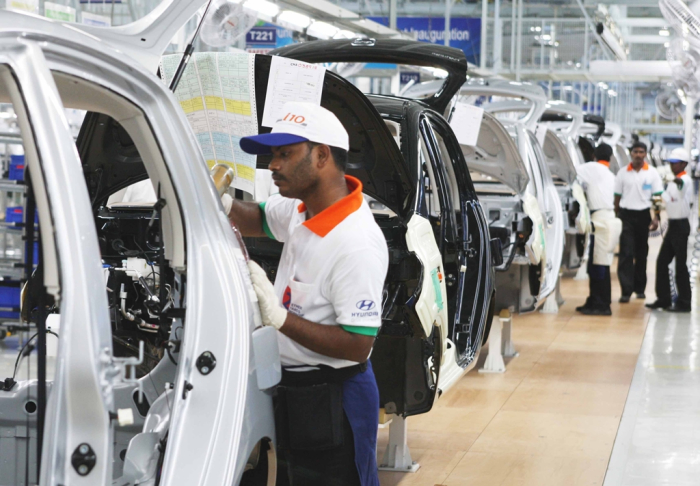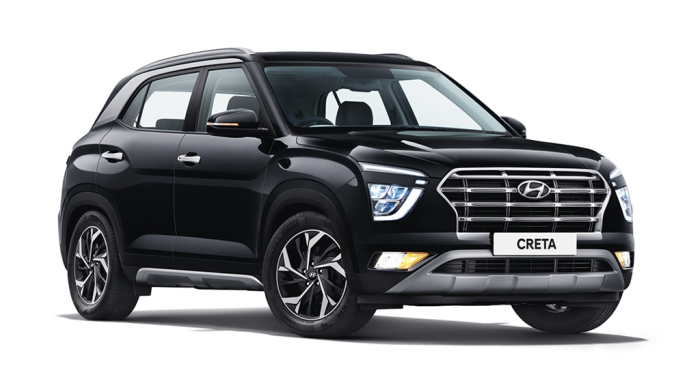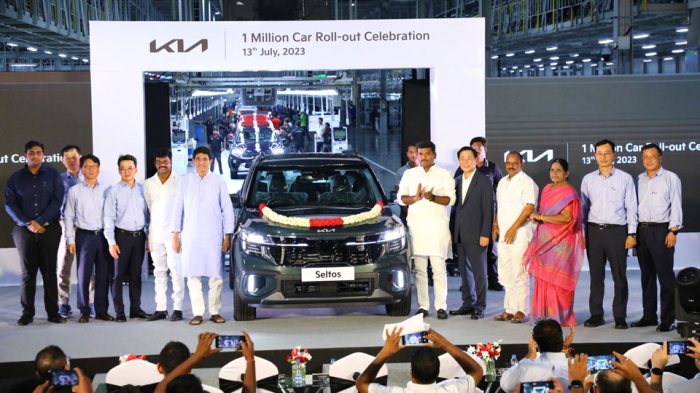Automobiles
Hyundai acquires GM’s Indian plant, aims to sell more SUVs, EVs
With the addition of a new plant, Hyundai and Kia aim to overtake Maruti Suzuki India as market leader
By Aug 16, 2023 (Gmt+09:00)
4
Min read
Most Read
LG Chem to sell water filter business to Glenwood PE for $692 million


Kyobo Life poised to buy Japan’s SBI Group-owned savings bank


KT&G eyes overseas M&A after rejecting activist fund's offer


StockX in merger talks with Naver’s online reseller Kream


Mirae Asset to be named Korea Post’s core real estate fund operator



Hyundai Motor Co. has acquired a car manufacturing plant in India from General Motors Co. as South Korea's top automaker aims to expand its presence in the world’s second-most populous country.
Hyundai Motor India Ltd. on Wednesday signed a deal to take over the US carmaker’s Talegaon plant in Maharashtra. Hyundai expects to get the Indian government’s approval on the deal by the end of this year.
The two companies didn’t reveal the value of the deal, but industry watchers estimated it in the hundreds of millions of dollars.
In March, Hyundai inked a term sheet with GM to acquire the factory, including land, buildings and equipment.
The plant with an annual production capacity of 130,000 units has been up for sale after GM withdrew from India in 2017 due to sluggish sales.

Several automakers such as India’s Mahindra and Mahindra Ltd. and China’s Great Wall Motor Co. (GWM) showed interest in the plant. GWM signed a deal to buy the factory from GM in 2020 but failed to acquire it as the Chinese carmaker could not obtain the necessary regulatory approval.
"This year is a significant milestone for Hyundai Motor India, as we celebrate 27 years of activity in the market,” said Kim Un-soo, chief executive of Hyundai Motor India. “As we reinforce our commitment to Atmanirbhar Bharat (Self-Reliant India), we intend to create an advanced manufacturing center for cars in Talegaon.”
He said operations at the Talegaon plant will begin in 2025.
ATTRACTIVE MAREKT FOR HYUNDAI
With about 4.76 million car sales in the domestic market last year, India is the world’s third-largest auto market after China and the US and among the fastest-growing electric vehicle markets in Asia. India is also the world’s second-most populous country after China.

With only a handful of companies offering electric cars, India’s EVs accounted for a mere 1% of its total four-wheeler sales in 2022. The Indian government is pushing to expand EV adoption by incentivizing carmakers and subsidizing consumers to raise the share of EVs to 30% of its total cars by 2030.
Currently, Hyundai and its affiliate Kia Corp. are together the No. 2 carmaker in India, controlling a fifth of the market, only behind top carmaker Maruti Suzuki India, the local unit of Japan’s Suzuki Motor.
Last year, Maruti Suzuki sold 1.58 million vehicles in India, followed by Hyundai and Kia, which sold a combined 807,067 units, and Tata Motors, which sold 526,821 cars.
Hyundai, which operates a plant in Chennai, dubbed the Detroit of Asia, with an annual production capacity of 820,000 vehicles, is expected to increase its output capacity to 1 million units with the acquisition of the GM factory and more investment.
The Korean company said in May it will invest 200 billion rupees ($2.45 billion) in the Indian state of Tamil Nadu over the next decade to strengthen its presence in India, which works as Hyundai’s South Asian hub.
Through its Indian subsidiary, Hyundai said it will set up a battery pack assembly plant in Chennai and install 100 fast EV charging stations across the southern state over the next five years.

INDIA-DEDICATED EVs
Hyundai plans to use the Talegaon factory as a manufacturing base for the production of its India-dedicated EVs.
To lead the Indian market, Hyundai plans to roll out more localized sport utility vehicles (SUVs) and five new electric vehicle models by 2032, while its sibling Kia plans to start producing India-tailored compact EVs in 2025 and supplying purpose-built vehicles in phases.
The Korean automotive group forecasts SUVs and EVs will lead the growth of the Indian car market, with SUVs projected to make up 48% of the country’s passenger car demand and EVs to sell 1 million by 2030.
During his visit to India last month, Hyundai Motor Group Chairman Chung Euisun said the company wants to become the first mover in the country, which is fast emerging as the next battlefield for global carmakers.
His trip to India, his first since he took the helm of Hyundai Motor Group in 2020, underscores Hyundai’s aspiration to distance itself from latecomers while striving to snatch the crown from Maruti Suzuki India, which controls 41.3% of the Indian car market.
The Indian government has vowed to ensure that EVs make up 30% of the country’s entire auto sales by 2030, a move that has triggered EV makers from across the world including Tesla Inc. to flock to the country with generous investment plans.

KIA LIKELY TO EXPAND FACILITIES IN INDIA
Kia, for its part, recently pledged to raise its market share in India to 10% from the current 6.7% by pushing out more models from its Indian car plant in Anantapur.
Kia has churned out more than 1 million cars from its Indian plant since its opening in 2019.
Industry sources said on Wednesday that Kia plans to expand its Indian factory’s annual production capacity, which currently stands at 171,000 units.
The carmaker is also considering building a second manufacturing plant in India, sources said.
Write to Il-Gue Kim and Nan-Sae Bin at Black0419@hankyung.com
In-Soo Nam edited this article.
More to Read
-
 AutomobilesInsatiable Hyundai Motor aspires to lead India with SUVs, EVs
AutomobilesInsatiable Hyundai Motor aspires to lead India with SUVs, EVsAug 08, 2023 (Gmt+09:00)
4 Min read -
 AutomobilesKia vows to take 10% of Indian market after 1 million car output
AutomobilesKia vows to take 10% of Indian market after 1 million car outputJul 14, 2023 (Gmt+09:00)
2 Min read -
 Electric vehiclesHyundai to invest $2.45 bn in India, eyes spot in global EV top 3
Electric vehiclesHyundai to invest $2.45 bn in India, eyes spot in global EV top 3May 12, 2023 (Gmt+09:00)
3 Min read -
 Korean stock marketMoney moves from US, China to India for higher returns
Korean stock marketMoney moves from US, China to India for higher returnsMay 09, 2023 (Gmt+09:00)
2 Min read -
 Korean stock marketChina, India: Korean investors’ next stock investment targets
Korean stock marketChina, India: Korean investors’ next stock investment targetsApr 19, 2023 (Gmt+09:00)
3 Min read
Comment 0
LOG IN


